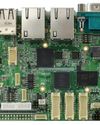Mitigate Timing and Interference Issues on Multicore Processors
Circuit Cellar
|August 2024
Missing multicore timing deadlines in a driver safety or aviation system is potentially catastropic. Adhering to guidance documents, and employing the appropriate testing and analysis methods ensures the efficient and deterministic execution of critical workloads.

Embedded software developers face unique challenges when dealing with timing and interference issues on heterogeneous multicore processor (MCP) based systems. Such systems offer higher CPU workload capacity and performance than single core processor (SCP) setups, but their complexity can make strict timing requirements extremely difficult to meet.
In hard real-time systems, deterministic execution is crucial for meeting operational and safety goals. Although MCP-based systems generally exhibit lower average execution times for a given set of tasks than do SCP systems, the distribution of these times is more variable.
This makes it difficult for developers to ensure precise timing for tasks, creating significant problems when they are building applications where meeting the worst execution times for individual tasks is more critical than meeting goals for average times.
To address such challenges, embedded software developers can turn to guidance documents like CAST-32A, AMC 20-193, and AC 20-193. In CAST-32A, the Certification Authorities Software Team (CAST) outlines important considerations for MCP timing and sets Software Development Life Cycle (SDLC) objectives for a better understanding of the behavior of a multicore system. While not prescriptive requirements, these objectives guide and support developers toward adhering to widely accepted standards like DO-178C.
In Europe, the AMC 20-193 document has superseded and replaced CAST-32A, and in the U.S., the AC 20-193 document has done the same. These successor documents, collectively referred to as A(M)C 20-193, largely duplicate the principles outlined in CAST-32A.
To apply the guidance from A(M)C 20-193, developers can employ various techniques for measuring timing and interference on MCPbased systems.
WORST-CASE EXECUTION TIMING
Diese Geschichte stammt aus der August 2024-Ausgabe von Circuit Cellar.
Abonnieren Sie Magzter GOLD, um auf Tausende kuratierter Premium-Geschichten und über 9.000 Zeitschriften und Zeitungen zuzugreifen.
Sie sind bereits Abonnent? Anmelden
WEITERE GESCHICHTEN VON Circuit Cellar

Circuit Cellar
The Future of Sensors in Safety Systems Sensing the Stop
How Magnetic Sensors Are Enabling the Next Generation of Braking Systems
5 mins
December 2025
Circuit Cellar
Alif Semiconductor Elevates Generative AI at the Edge with New Support for ExecuTorch Runtime in Its Ensemble MCUs
Alif Semiconductor, the leading global supplier of secure, connected, power efficient Artificial Intelligence and Machine Learning (AI/ML) microcontrollers (MCUs) and fusion processors, announced that developers can now use the ExecuTorch Runtime, a quantization extension of the popular PyTorch ML framework, for AI applications built to run on its Ensemble E4/E6/E8 series of MCUs and fusion processors.
1 min
December 2025

Circuit Cellar
Encrypted MQTT Protocol for Critical Sectors
Mechanisms, Challenges, and Best Practices
3 mins
December 2025

Circuit Cellar
Datasheet: Small Size, Big Power
Smaller Microcontrollers Bring New Possibilities
9 mins
December 2025

Circuit Cellar
Analog Devices Launches ADI Power Studio and New Web-Based Tools
Analog Devices, Inc. (ADI), a global semiconductor leader, announced the launch of ADI Power Studio, a comprehensive family of products that offers advanced modeling, component recommendations, and efficiency analysis with simulation.
1 mins
December 2025

Circuit Cellar
Compact IBR300 2.5" SBC Powered by NXP i.MX 93 from IBASE
IBASE Technology, Inc., a leading provider of rugged embedded computing platforms, announced the release of the IBR300, a 2.5\" RISC-based single board computer (SBC) powered by the NXP i.MX 93 processor with dualcore ARM Cortex-A55 (up to 1.7GHz) and a Cortex-M33 MCU.
1 min
December 2025

Circuit Cellar
Sensors in the Spotlight
The Next Decade of Embedded Sensor Systems
12 mins
December 2025

Circuit Cellar
Bob's Wrap Up
In Bob's last article with Circuit Cellar, he attempts to wrap up a career of more than 50 years as an embedded systems engineer and 14 years with Circuit Cellar. He looks at each of his 58 articles by category and provides some recommendations for his fellow engineers.
7 mins
December 2025

Circuit Cellar
Designing Embedded Software Architectures That Last
I've reviewed hundreds of firmware projects over the years, and one thing always stands out: the most successful projects have a clear, deliberate architecture.
10 mins
December 2025
Circuit Cellar
Broadcom Introduces Industry's First Wi-Fi 8 Silicon Ecosystem Powering the AI Era
Broadcom, Inc. unveiled the first Wi-Fi 8 silicon solutions for broadband wireless, targeting residential gateways, enterprise access points, and smart mobile clients.
1 mins
December 2025
Listen
Translate
Change font size

